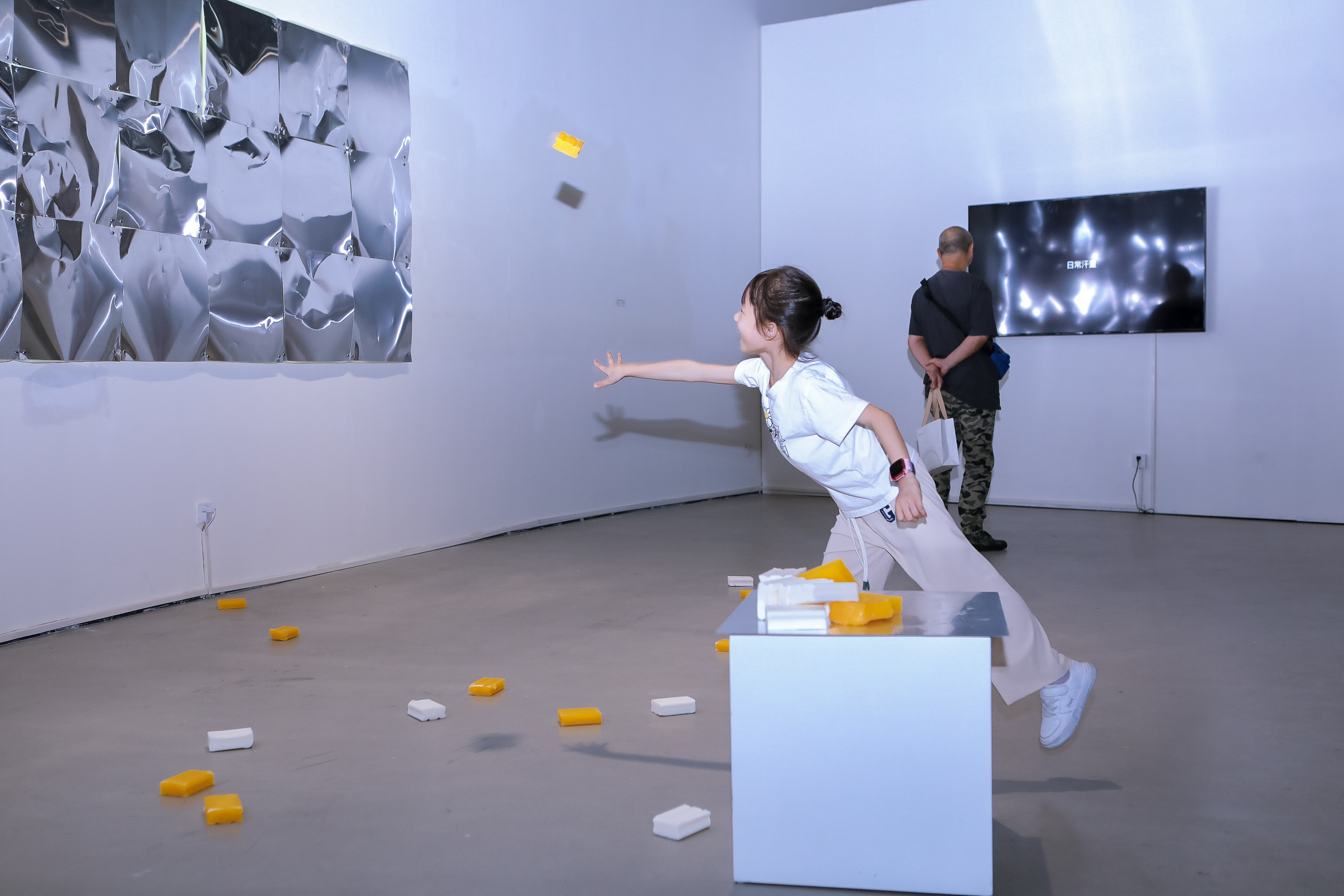Artron presents a retrospect in contemporary art
Source: Shenzhen DailyUpdated: 2023-09-21
The vast space on the fifth floor of the Artron Art Center in Nanshan District was crowded on the afternoon of Sept. 16, as several hundred from Shenzhen’s art circles and fans attended the opening of a retrospective exhibition of Chinese contemporary art, featuring 17 artists previously nominated for or winning the Award of Art China (AAC) titles.
First unveiled in 2006, the AAC awards recognize the most prominent artists and young talents in contemporary art each year until the selection and awarding ceremonies were halted during the pandemic in 2021, replaced by a retrospective exhibition since.
Curated by Guo Yun, this year’s exhibition is titled “The Wild Theater,” which echoes a contemporary art show between October 2017 and January 2018 presented by New York’s Guggenheim that featured dozens of Chinese artists and was named “Theater of the World.”

Visitors are examining Zhang Xiaotao’s oil painting “Meet in 2022.” Photos courtesy of the organizer
Guo, a Shenzhen-based art critic and independent curator, said the exhibition is a kind of theater where artists present new exotic landscapes they created out of their concepts, philosophy and wild imagination for the audience.
Embodying the belief that everything is possible in current art, the exhibition presents sculptures, installations and videos, as well as paintings.
Stepping out of the elevator on the fifth floor, visitors are greeted by Cao Yu’s “The Colorful Clouds,” or to be more exact, they will have to walk over the piece, which consists of a massive tangle of black bras on the ground.
Often presenting a feminist angle, Cao observes that some people may find her works “offensive” or “making them feel a bit uneasy.” “Men and women always respond differently to my works,” she says, adding that most women have a shy and sorry look in their eyes having to step over the bras while some men show contempt and indignation when confronted with the work.

A visitor takes photos of Liu Bolin’s photography works.
Cao also brings a video to the exhibition, in which she repeats a long list of things she has for over four minutes, with the camera focused on a close-up of her face. In this video work titled “I Have,” she brags about her educational background, good looks, successful career, material wealth and happy family life. “I act as a puppet in this video,” Cao explains.
“These ‘I haves’ are what society expects of a ‘successful woman,’ which is impossible for most of us to achieve. On one hand, many who have these things are not actually happy because they are superficial and don’t guarantee happiness. On the other hand, many who don’t have them feel the pressure and get jealous of those who have them.”
Cao, born in Northeast China’s Liaoning Province, feels that creating art is a healing process for her. “My father said that at my birth, his family was not blessed since the firstborn was a girl. All the unfair and unhappy things that happened while I was growing up fueled my art, which in due process, helped me come to terms with my life,” she said.
Yin Xiuzhen, another female artist featured at the exhibition, presents an installation named “Tree,” which occupies a central spot and immediately catches the attention of curious visitors. The complex structure made of tailpipes, mufflers and exhausts becomes a versatile utensil, from whose openings sprout many different kinds of plants. The installation is a striking reminder of how tenacious and peaceful other species have tried to survive on this planet, which we humans have long taken for granted and damaged for our own convenience or out of greed.

A kid tries the interactive installation “Weakness” by Li Liao.
Environmental protection awareness is also evident in Chen Xi’s acrylic on canvas work titled “Ten Gluttons.” The huge painting features 10 rabbits sitting side by side along a long table, their plates empty and their knives dripping with blood. In the lower half of the painting are 10 species that have forever disappeared into oblivion after their extinction, including the northern white rhino, Atlas bear and Barbary lion.
Tan Ping, an artist in his 60s who was trained in the Central Academy of Arts in Beijing and in the Berlin University of the Arts, showcases inspiration from Chinese and Western philosophies in his works. Progressing from realism to abstract painting, Tan is continuously experimenting and seeking to purify his works to express his personal thoughts and emotions.
Many of his works are named “Untitled,” including one oil on canvas piece presented at the exhibition, which features dots, lines and shapes with vibrant or soft colors such as pink, brown, green and many shades in between. The end effect is a beautiful and serene work open to the viewers’ interpretation.
Xu Qiaosi, an art critic attending the exhibition Saturday, says she feels such a collection of works with raw personal expressions are welcome in the local art scene, which is now prevalent with delicate commercialized works catering to the public’s taste.
The exhibition, which also presents the works of Dai Yun, Yang Xinguang, Liu Bolin, Wei Jia, Jiang Zhi and others, will last until Oct. 30.
 Copyright © Shenzhen Nanshan Information Network Center. All rights reserved.
Copyright © Shenzhen Nanshan Information Network Center. All rights reserved.




